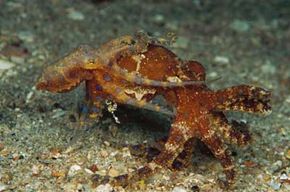Octopus Reproduction: Birth, Life, Death and Birth Again.
A juvenile octopus grows at a rapid rate, perhaps because of its short life span. Extremely effective at turning the food it eats into body mass, a young octopus increases its weight by 5 percent each day. By the end of its life, an octopus will weigh one-third as much as all the food it has eaten [source: The Economist]. The common octopus only lives an average of three to five years, though, so it doesn't have much time to waste.
Once the octopus reaches adulthood, it will eventually get the urge to mate. As with most creatures, the octopus's main purpose in life is to reproduce. However, if it knew just what was waiting for it soon after, it might think twice. Both the male and female octopuses die soon after mating. The male dies a few months afterward, while female dies shortly after the eggs hatch. For octopuses, mating is a pretty subdued affair. A few species have flashy mating rituals, but many octopuses seem like they're just conducting business.
Advertisement
The male octopus has a modified arm called the hectocotylus, which is about 3 feet (1 meter) long and holds rows of sperm. Depending on the species, he will either approach a receptive female and insert the arm into her oviduct or take off the arm and give it to her to store in her mantle for later. In the latter scenario, the female keeps the arm until she lays her eggs, at which time she takes the arm out and spreads the sperm over her eggs to fertilize them.
The female meticulously cares for her eggs until they hatch, forgoing food the entire time. She blows currents across the eggs to keep them clean and protects them from predators. The eggs might incubate anywhere from two to 10 months, depending on the species and the water temperature. Once they hatch, they're on their own – one source cites an estimated 1 percent survival rate for the giant Pacific octopus from hatchling to 10 millimeters. Depending on the species, some octopuses begin life as minuscule specks floating on the ocean's surface that drift down upon reaching a larger size, while some start out a bit bigger on the ocean's bottom. Little else is known about the early lives of octopuses [source: Scheel].
A substantial amount of research has been done, however, on octopuses' intelligence. On the next page, you'll meet an octopus named Lucretia McEvil and find out if cephalopods live up to their reputation as the brainiacs of the invertebrate world.
